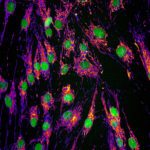Lien vers Pubmed [PMID] – 36056923
Lien DOI – S1098-3600(22)00875-910.1016/j.gim.2022.07.023
Genet Med 2022 Nov; 24(11): 2308-2317
Hereditary spastic paraplegia type 4 is extremely variable in age at onset; the same variant can cause onset at birth or in the eighth decade. We recently discovered that missense variants in SPAST, which influences microtubule dynamics, are associated with earlier onset and more severe disease than truncating variants, but even within the early and late-onset groups there remained significant differences in onset. Given the rarity of the condition, we adapted an extreme phenotype approach to identify genetic modifiers of onset.We performed a genome-wide association study on 134 patients bearing truncating pathogenic variants in SPAST, divided into early- and late-onset groups (aged ≤15 and ≥45 years, respectively). A replication cohort of 419 included patients carrying either truncating or missense variants. Finally, age at onset was analyzed in the merged cohort (N = 553).We found 1 signal associated with earlier age at onset (rs10775533, P = 8.73E-6) in 2 independent cohorts and in the merged cohort (N = 553, Mantel-Cox test, P < .0001). Western blotting in lymphocytes of 20 patients showed that this locus tends to upregulate SARS2 expression in earlier-onset patients.SARS2 overexpression lowers the age of onset in hereditary spastic paraplegia type 4. Lowering SARS2 or improving mitochondrial function could thus present viable approaches to therapy.

